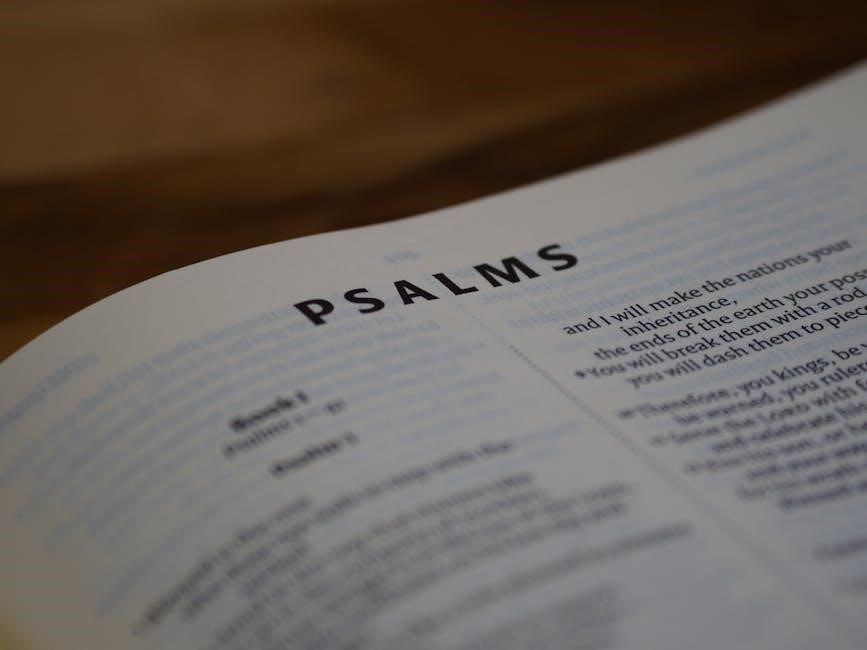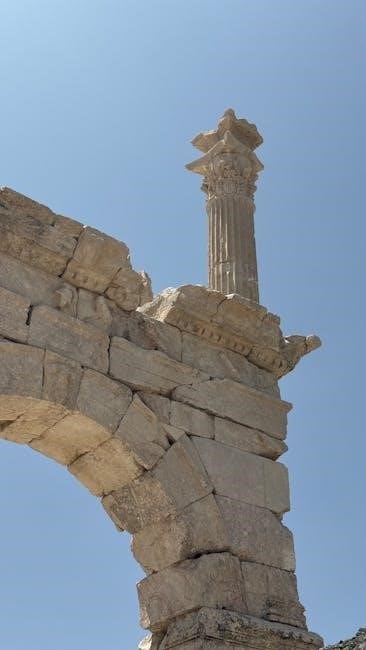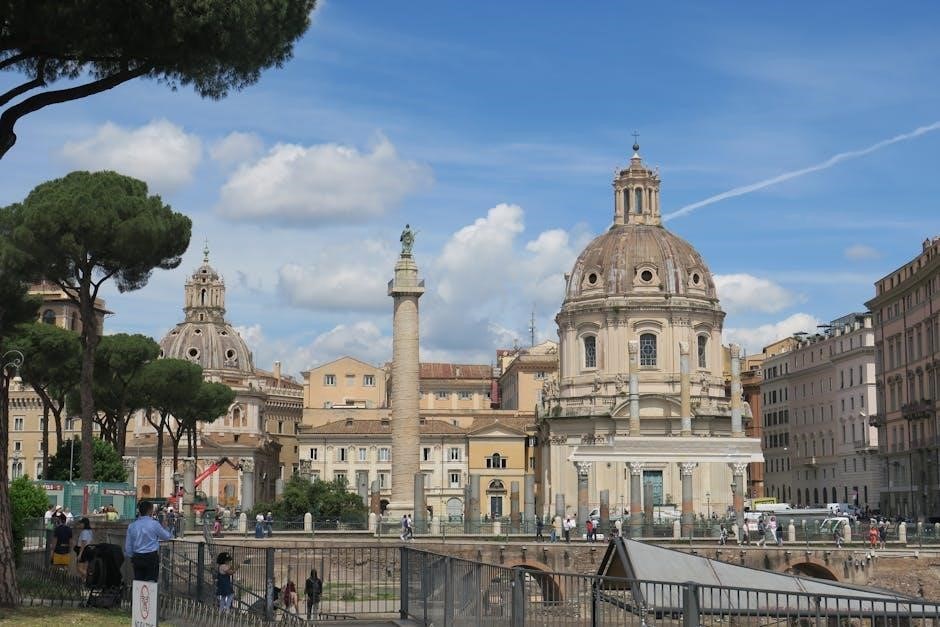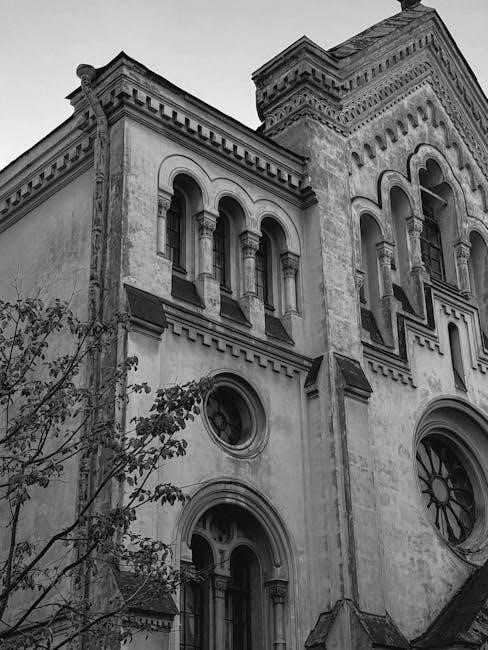David’s life, as detailed in Scripture, embodies a transformative journey from a humble shepherd to Israel’s greatest king, showcasing his deep relationship with God and enduring legacy.
1.1. David as a Central Figure in Scripture
David stands as a pivotal figure in the Bible, exemplifying faith, leadership, and redemption. His journey from shepherd to king highlights God’s divine plan and grace. As a man after God’s own heart, David’s life reflects human frailty and divine forgiveness, making him a relatable and enduring symbol of spiritual growth. His lineage is crucial, as Jesus Christ, the Messiah, descends from him, solidifying his central role in redemptive history. David’s story, deeply woven into Scripture, inspires and instructs believers across generations.
1.2. The Significance of David’s Life in Biblical Narrative
David’s life is pivotal in biblical narrative, illustrating God’s sovereignty and redemption. His experiences—from triumphs as a shepherd and warrior to struggles with sin and repentance—offer profound spiritual lessons. As king, he unified Israel and established Jerusalem, laying the foundation for the Messiah. His legacy, marked by faith and vulnerability, serves as a timeless example of divine grace and human response. David’s story underscores God’s faithfulness, making him a cornerstone in the Bible’s overarching story of salvation and kingdom establishment.

Early Life of David
David was born in Bethlehem as the youngest son of Jesse, tending his family’s flock as a shepherd. His early life set the stage for divine anointing.
2.1. David’s Birth and Family Background
David was born in Bethlehem, the eighth and youngest son of Jesse, from the kingly tribe of Judah. His humble beginnings as a shepherd were overshadowed by divine selection. Despite being overlooked by his family, God chose David through Samuel’s anointing, recognizing his heart. This pivotal moment set the stage for his future as Israel’s king, highlighting God’s preference for the unlikely candidate.
2.2. David as a Shepherd in Bethlehem
David’s early life as a shepherd in Bethlehem shaped his character and faith. Tending his father’s flocks, he developed humility, responsibility, and a deep trust in God. This period, often overlooked, was crucial in preparing him for future challenges. His experiences as a shepherd influenced his writing of psalms, reflecting his reliance on divine guidance and provision. This humble role laid the foundation for his eventual rise to leadership, demonstrating God’s ability to use ordinary circumstances for extraordinary purposes;
2.3. The Anointing of David by Samuel
The anointing of David by Samuel marks a pivotal moment in his life. Samuel, guided by God, visited Jesse’s household in Bethlehem to appoint a new king. Despite David being the youngest, God chose him, emphasizing that divine selection is based on the heart, not outward appearance. This act of anointing signified David’s divine ordination as Israel’s future king, setting him apart for leadership and fulfilling God’s plan. The event showcased God’s supernatural intervention in David’s life, preparing him for his royal destiny and spiritual significance.
Rise to Prominence
David’s rise began with defeating Goliath, showcasing his faith and bravery, which led to fame and recognition, but also sparked King Saul’s jealousy and eventual pursuit.
3.1. David and Goliath: The Battle with the Giant
David’s confrontation with Goliath, a towering Philistine giant, showcased his unwavering faith in God. Armed with a sling and stone, David trusted divine power over military might. The giant’s size and threats intimidated Israel’s army, but David, confident in God’s deliverance, accepted the challenge. The battle was not just physical but spiritual, highlighting David’s reliance on divine strength. Goliath’s defeat symbolized God’s triumph over human arrogance, establishing David as a hero and a symbol of faith for Israel.
3.2. David’s Relationship with King Saul
David’s relationship with King Saul began with promise but deteriorated into turmoil. Initially, David served Saul as a musician and armor-bearer, bringing comfort with his harp. However, Saul’s jealousy grew as David’s fame increased, especially after defeating Goliath. Saul’s fear of losing the throne led to attempts on David’s life, forcing David into exile. Despite Saul’s relentless pursuit, David consistently showed mercy, refusing to kill Saul even when given opportunities. Their complex dynamic highlights themes of jealousy, power struggles, and David’s unwavering trust in divine providence.
3.3. David’s Exile and Life as a Fugitive
During his exile, David lived as a fugitive, fleeing Saul’s relentless pursuit. He found refuge in various places, including the cave of Adullam and the forests of Judah. Despite hardships, David remained faithful, trusting God’s plan. He gathered loyal followers and continued to lead with integrity, demonstrating resilience and faith amidst adversity. This period shaped David’s character, preparing him for future kingship and deepening his reliance on divine guidance.
Reign as King of Israel
David’s reign as king showcased his leadership, military victories, and spiritual devotion. He established Jerusalem as the capital, brought the Ark of the Covenant, and strengthened Israel’s unity, leaving a lasting legacy.
4.1. David’s Reign in Hebron
Following Saul’s death, David was anointed king over the tribe of Judah in Hebron, where he reigned for seven years. This period marked the beginning of his royal leadership, as he established a stronghold and consolidated his power. Despite initial limitations to Judah, David’s effective rule and military successes laid the foundation for his eventual kingship over all Israel. His reign in Hebron was a transitional phase, preparing him for the greater responsibilities of ruling a unified nation from Jerusalem.
4.2. Establishing Jerusalem as the Capital
David captured Jerusalem, making it his capital, uniting Israel under one rule. He brought the Ark of the Covenant to the city, establishing it as a center of worship. Jerusalem’s central location strengthened national unity and solidified David’s authority. The city became a symbol of God’s presence among His people. During his 33-year reign in Jerusalem, David fortified the city and laid the foundation for its future glory, including preparations for the temple his son Solomon would later build. This period marked the zenith of Israel’s political and religious life under his leadership.
4.3. The Highlights of David’s Kingship
David’s reign is marked by military victories, administrative organization, and spiritual renewal. He subdued the Philistines, expanding Israel’s borders and securing peace. David established a strong central government, organizing the priesthood and creating a skilled army. He also promoted worship, composing psalms that expressed his devotion to God. His leadership laid the foundation for Israel’s golden age, blending political strength with spiritual depth. These achievements solidified his legacy as a wise and godly ruler, leaving a lasting impact on Israel’s history and culture.

Personal Life and Struggles
David’s personal life was marked by his marriage to Bathsheba, ensuing family conflicts, and his journey of repentance, reflecting his deeply human struggles and divine grace.
5.1. David’s Marriage to Bathsheba
David’s marriage to Bathsheba occurred amid moral failure, as she was the wife of Uriah, one of his loyal soldiers; Their affair led to her pregnancy, and David, attempting to conceal his sin, orchestrated Uriah’s death in battle. Confronted by Nathan, David repented, acknowledging his wrongdoing. Despite the child’s death, Bathsheba later became the mother of Solomon, who succeeded David as king. This narrative highlights the consequences of sin and the possibility of redemption through genuine repentance, showcasing David’s humanity and divine grace.
5.2. The Consequences of David’s Sin
Davids sin with Bathsheba led to severe consequences, including the death of their first child. Nathan confronted David, and he repented, acknowledging his wrongdoing. This sin brought turmoil to his family and marred his relationship with God. The incident also exposed the human frailty of a man otherwise deeply devoted to God, serving as a cautionary tale about the repercussions of moral failure. Despite his repentance, the aftermath of his actions lingered, shaping the rest of his life and legacy.
5.3. Family Conflicts and Rebellion
Davids family life was marked by turmoil, particularly through his sons. Absalom, fueled by resentment, led a rebellion against his father, causing division in the kingdom. Additionally, the rape of Tamar by Amnon and the subsequent revenge by Absalom created deep rifts. These conflicts highlighted Davids struggles as a father and ruler, as personal and political challenges intertwined. Despite his efforts to maintain unity, the rebellions and internal strife left lasting scars on his family and reign, underscoring the complexities of leadership and kinship.

Later Life and Death
King David’s later years were marked by physical decline and political challenges, including the struggle over succession. His life ended in Jerusalem at 70, buried with honor.
6.1. David’s Old Age and Succession
In his old age, David faced physical decline and political challenges. His reign spanned 40 years, with 7 in Hebron and 33 in Jerusalem. As his health waned, succession became a contentious issue. Adonijah, with support from Joab and Abiathar, sought the throne, but Bathsheba and Nathan ensured Solomon’s rightful succession. David, though frail, reaffirmed Solomon as his heir, instructing him to follow God and uphold justice. This pivotal moment secured the Davidic dynasty, reflecting David’s enduring wisdom and faith in God’s plan.
6.2. The Final Days of King David
In his final days, King David’s physical strength waned, and he faced challenges maintaining order. Despite his declining health, he remained a symbol of authority. His advisors sought to secure the throne, leading to tension over succession. David’s last acts included instructing Solomon to uphold justice and faithfulness to God. His final days were marked by reflection on his legacy and the transition of power, ensuring the continuation of his dynasty. David’s life ended with the assurance of God’s promise, leaving a lasting impact on Israel’s history and spiritual heritage.
6.3. The Death of David and His Burial
King David died at the age of 70 in Jerusalem, after a 40-year reign. His burial in the City of David marked the end of an era. The location of his tomb became a sacred site, symbolizing his enduring legacy. David’s death underscored the fulfillment of God’s covenant with him, as his dynasty continued through Solomon. His burial place remained a testament to his life, reign, and spiritual significance in Israel’s history, solidifying his role as a central figure in biblical narrative and God’s redemptive plan.

Spiritual Life and Legacy
David’s spiritual journey showcased his deep relationship with God, marked by repentance and faith. His Psalms remain a testament to his devotion, inspiring generations in worship and faith.
7.1. David as a Man After God’s Own Heart
David’s life exemplified his divine alignment with God’s will, earning him the title “a man after God’s own heart.” His obedience, reliance on divine guidance, and heartfelt repentance showcased his deep spiritual connection. Despite flaws, his humility and willingness to seek forgiveness reflected a sincere commitment to God. His Psalms reveal a heart bent toward worship and devotion, making him a timeless example of spiritual authenticity and passion for God. This legacy underscores his enduring impact as a spiritual leader and worshipper.
7.2. David’s Repentance and Restoration
David’s life is marked by profound repentance and divine restoration. After his sin with Bathsheba and the subsequent murder of Uriah, Nathan’s confrontation led David to acknowledge his wrongdoing. His heartfelt repentance, expressed in Psalm 51, demonstrated genuine remorse and a desire for spiritual cleansing. Despite the consequences of his actions, God’s mercy and grace restored David’s relationship with Him. This narrative highlights the transformative power of repentance and God’s faithfulness in redeeming even the darkest moments of human failure, affirming His love and forgiveness. David’s story remains a testament to divine restoration.
7.3. The Psalms of David and Their Significance
David’s Psalms are a profound expression of his spiritual journey, capturing emotions from joy and praise to sorrow and repentance. Many of the Psalms reflect his personal experiences, struggles, and devotion to God, offering timeless wisdom and comfort. These writings showcase David’s role as a “man after God’s own heart,” emphasizing his deep connection with the divine. The Psalms not only serve as individual prayers but also as communal worship, resonating across generations. Their enduring relevance highlights David’s legacy as a poet, worshipper, and spiritual leader, deeply influencing both Jewish and Christian traditions.
The Legacy of David
David’s legacy endures as a central figure in Scripture, establishing the lineage of Jesus Christ and profoundly influencing Jewish and Christian traditions through his faith and leadership.
8.1. David’s Role in the Lineage of Jesus Christ
David’s lineage is pivotal in Scripture, as he is an ancestor of Jesus Christ, fulfilling prophetic promises. The New Testament traces Jesus’ genealogy through David, emphasizing His messianic identity. This connection underscores David’s enduring significance in God’s redemptive plan, bridging the Old and New Testaments. His kingship foreshadowed Christ’s eternal reign, making David’s legacy central to Christian theology and the fulfillment of biblical prophecy.
8.2. The Cultural Impact of David’s Life
David’s life has left an indelible mark on culture, inspiring art, literature, and music for centuries. His iconic stories, such as defeating Goliath, symbolize courage and faith. The Psalms, attributed to David, are revered in worship and literary traditions. His reign as Israel’s greatest king has influenced political and religious thought. Beyond religion, David’s narrative has shaped cultural ideals of leadership, redemption, and divine purpose, making him a universal figure transcending time and faith boundaries.
8.3. David’s Enduring Influence in Jewish and Christian Tradition
David’s legacy endures profoundly in both Jewish and Christian traditions. In Judaism, he is celebrated as Israel’s greatest king, a symbol of divine leadership, and the ancestor of the Messiah. The Psalms, attributed to David, remain central to Jewish worship and devotion. In Christianity, David is revered as a forerunner of Jesus Christ, emphasizing God’s covenant promises. His life exemplifies faith, repentance, and divine grace, bridging the Old and New Testaments. His influence shapes worship, theology, and cultural identity across both traditions.























































